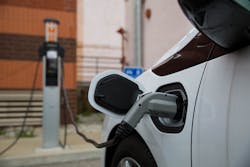EPRI’s U.S. National Electrification Assessment (USNEA) evaluates customer adoption of electric end-use technologies over the next three decades as well as associated implications for the environment, efficiency and the grid. The assessment also draws attention to needed research and development that could guide the transition. The report can be found here: https://www.epri.com/#/pages/product/3002013582/.
Not too surprisingly based on historical experience, the study finds that greater electrification results in a reduction in energy consumption due to greater efficiencies in electric technologies, growth in electric load and a reduction in greenhouse gas (GHG) emissions. Interesting aspects of this study include how changes in technology cost and performance affect outcomes. One example is the examination of different rates of decline in the relative cost of electric vehicles, a key technology for electrification around the world. Also, while the issue of carbon taxes has not been a major topic recently, EPRI continues to investigate, as it should, the impact of potential economy-wide carbon surcharges. In addition, EPRI reports on a natural gas price sensitivity analysis that examines the potential impact of rising gas costs on electrification. EPRI’s extensive modeling capabilities and its detailed knowledge of energy trends such as energy efficiency make its technology assumptions quite defensible. State-level policies which also have a major impact on the power industry are used to help guide electricity trend projections.
Are you curious about future electric load growth, electric vehicle use, electricity usage for heating and cooling and grid modernization? Check out this study!
About the Author
David Shadle
Grid Optimization Editor
Dave joined the T&D World team as the editor of the Grid Optimization Center of Excellence website in January 2016.
Dave is a power industry veteran with a history of leading environmental and development organizations, championing crucial projects, managing major acquisitions and implementing change. Dave is currently a principal at Power Advance, LLC, an independent consulting firm specializing in power project development, research and analysis, due diligence and valuation support. Dave is also a contributing consultant for Transmission & Distribution World. Prior to Power Advance, Dave held business and power project development positions with The Louis Berger Group, Iberdrola Renewables, FPL Energy and General Public Utilities. He is a graduate of Pennsylvania State University, the New Jersey Institute of Technology and Purdue University.
